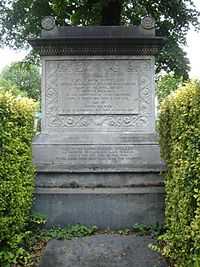John Robinson McClean
| John Robinson McClean | |
|---|---|
 Ceramic bust of McClean made in 1869 | |
| Born |
21 March 1813 Belfast, Northern Ireland |
| Died | 13 July 1873 (aged 60) |
| Nationality | British |
| Education | University of Glasgow |
| Engineering career | |
| Engineering discipline | civil engineer |
| Institution memberships | Institution of Civil Engineers (president) |
| Practice name | South Staffordshire Water Works Company |
| Significant projects | South Staffordshire Railway, Suez Canal |
John Robinson McClean CB FRS (21 March 1813 – 13 July 1873), was a British civil engineer and Liberal Party politician.
Early life
He was born in Belfast. Educated at Belfast Academical Institution and University of Glasgow.
Engineering career
Whilst still young, he offered himself as candidate for the Office of Engineer to the Belfast Harbour Commissioners, but was refused. Upon leaving the Board Room, he said to Mr Edmund Getty, (an old family friend) “that he would let the Commissioners yet see what a man they had lost”.
With his partner, F. C. Stileman, he founded McClean & Stileman, engineering consultants of Great George St, Westminster. Some of his positions were:
- Advisor on the Suez Canal for the British Government.
- Extensive works for Emperor Napoleon in France.
- Chief Engineer of the Plymouth and Dover Harbours.
- Chairman of the Anglo-American Telegraph Company.
- Chief Engineer overseeing construction of the South Staffordshire Railway, which opened in 1849.
After an Act of Parliament was passed to allow it, he took a 25-year lease on the railway, thus becoming the first person ever to be the sole owner of a railway. With the financial backing of several businessmen, he planned and built "The South Staffordshire Water Works Company" which piped fresh water to all of the Black Country. He was also the owner, with partner Richard Chawner, of "The Cannock Chase Colliery Company".
He was President of the Institution of Civil Engineers from 1864-5.[1]
Political career
He unsuccessfully stood for Parliament as a Liberal Party candidate for Belfast at the 1857 general election,[2] the second time he had been rejected by his native town.
He was elected at the 1868 general election as the Member of Parliament (MP) for East Staffordshire,[3] and held the seat until his death in 1873.[3][4]
He was also Lieutenant-Colonel of the Engineer and Railway Staff Corps, a volunteer corps whose members serve as engineering advisors to the British Army.

Later life
He died in 1873, and is buried at Kensal Green Cemetery, London.
Personal life
He was married to Anna (1813–1877). They had five daughters and one son, Frank McClean.
References
- ↑ Watson, Garth (1988). The Civils. London: Thomas Telford Ltd. p. 251. ISBN 0-7277-0392-7
- ↑ Walker, B. M. (1978). Parliamentary election results in Ireland 1801–1922. Dublin: Royal Irish Academy. p. 89. ISBN 0-901714-12-7.
- ↑ 3.0 3.1 Craig, F. W. S. (1989) [1977]. British parliamentary election results 1832–1885 (2nd ed.). Chichester: Parliamentary Research Services. p. 455. ISBN 0-900178-26-4.
- ↑ Leigh Rayment's Historical List of MPs – Constituencies beginning with "S" (part 4)
| Parliament of the United Kingdom | ||
|---|---|---|
| New constituency | Member of Parliament for East Staffordshire 1868–1873 With: Michael Arthur Bass |
Succeeded by Samuel Allsopp and Michael Arthur Bass |
| Professional and academic associations | ||
| Preceded by John Hawkshaw |
President of the Institution of Civil Engineers December 1863 – December 1865 |
Succeeded by John Fowler |